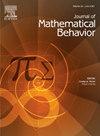Upper secondary students’ ways of operationalizing the ‘for all’ statement in examining differentiability of a function using CAS
IF 1.7
Q3 EDUCATION & EDUCATIONAL RESEARCH
引用次数: 0
Abstract
Mathematical statements involving logical quantifiers are essential in calculus and for mathematical thinking. At upper secondary level mathematics, students are confronted with the universal quantifier in the definition of differentiability of a function, going from pointwise to global (or piecewise) considerations. Based on empirical cases of students in Danish upper secondary school working with tasks on differentiability, the paper addresses students’ ways of operationalizing the ‘for all’ statement of differentiability when using Computer Algebra Systems (CAS). The analyses of the cases illustrate three different operationalizations, which build on some of the same interpretations of the universal quantifier but turned into actions in different ways. Applying instrumental genesis together with Vergnaud’s notion of scheme, the analyses illustrate how students’ anticipations of dealing with ‘for all’ differ from their operationalizations when transitioning to instrumented techniques. This is important to take into consideration when teaching ‘for all’, designing tasks and selecting if, for what and how CAS should be applied in these settings.
高中生在用CAS检验函数可微性时对“for all”语句的操作方法
涉及逻辑量词的数学陈述在微积分和数学思维中是必不可少的。在高中阶段的数学中,学生在定义函数的可微性时要面对通用量词,从点到全局(或分段)的考虑。基于丹麦高中学生处理可微性任务的经验案例,本文讨论了学生在使用计算机代数系统(CAS)时实现“for all”可微性陈述的方法。对案例的分析说明了三种不同的操作化,它们建立在对全称量词的一些相同解释之上,但以不同的方式转化为行动。运用工具起源和Vergnaud的方案概念,分析说明了当过渡到工具技术时,学生对“为所有人”处理的期望与他们的操作方式不同。在“为所有人”教学、设计任务和选择在这些环境中应用CAS的内容和方式时,考虑到这一点很重要。
本文章由计算机程序翻译,如有差异,请以英文原文为准。
求助全文
约1分钟内获得全文
求助全文
来源期刊

Journal of Mathematical Behavior
EDUCATION & EDUCATIONAL RESEARCH-
CiteScore
2.70
自引率
17.60%
发文量
69
期刊介绍:
The Journal of Mathematical Behavior solicits original research on the learning and teaching of mathematics. We are interested especially in basic research, research that aims to clarify, in detail and depth, how mathematical ideas develop in learners. Over three decades, our experience confirms a founding premise of this journal: that mathematical thinking, hence mathematics learning as a social enterprise, is special. It is special because mathematics is special, both logically and psychologically. Logically, through the way that mathematical ideas and methods have been built, refined and organized for centuries across a range of cultures; and psychologically, through the variety of ways people today, in many walks of life, make sense of mathematics, develop it, make it their own.
 求助内容:
求助内容: 应助结果提醒方式:
应助结果提醒方式:


